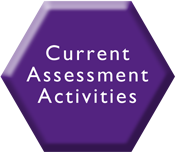Current Assessment Activities

As part of our Assessment 2.1 Plan, each year one student learning outcome is targeted
for planning, development, and/or revision, and another is the focus of implementation
and campus-wide education, designated the "Year of [student learning outcome]." Of
course, there is also ongoing data collection on all of the student learning outcomes each year.
The 2025-2026 academic year is the year of Diverse Perspectives.
SLATE Subcommittee Implementation Activities:
1. Educate the campus community about the student learning outcome.
2. Work with individuals and committees to incorporate the student learning outcome into a variety of campus activities.
3. Assist in the facilitation of the spring book study.
4. Analyze data from the implementation year to produce an assessment report on (a) results related to the learning outcome, (b) institutional effectiveness based on the results, and (c) possible actions to take based on the results and any other relevant data.
5. Create a summary of year of implementation educational activities.
6. Present the assessment report and summary of implementation activities as a final report to the SLATE committee and at the annual "Closing the Loop" Workshop.
During this same year, the Effective Communication Subcommittee is engaged in Planning
and Development Activities.
SLATE Subcommittee Planning and Development Activities:
Charge to subcommittee: To develop or reconfirm workable, reasonable, meaningful,
and useful assessment tools (n= 1-3) to evaluate student mastery of the identified
learning outcome. The subcommittee will strive to accomplish the following tasks.
September and October
1. Clarify or reconfirm the outcome: What does it look like? What does it mean? Identify measurable performance indicators (specific behaviors) that would show mastery of the outcome.
2. Where is this outcome taught or acquired? What opportunities are available for students?
November
1. Answer the questions. What assessment tools do we already have (direct or indirect)? What data do we already have? What do we already know about baseline performance?
2. Consult with the Office of Institutional Research to obtain assessment data and
guidance on assessment tools.
January and February
1. Choose or reconfirm one or two performance indicator(s).
2. Choose, develop, or reconfirm the assessment tool(s) that will be used to systematically assess the chosen indicator(s).
3. Identify or reconfirm who will be assessed, when they will be assessed, and how they will be assessed.
4. Identify or reconfirm who will be responsible for conducting the assessment(s)
and reporting the results.
March
1. Attend SLATE Committee meeting to present a draft of plan and receive feedback.
2. Revise the plan based in SLATE feedback.
April
1. Submit a final report to the SLATE Committee.
2. Discuss a plan for the Implementation year and develop a list of possible educational
activities and methods for promoting the learning outcome across campus.
3. Send a list of three possible readings (related to the outcome) for the faculty book study to the Provost Fellow.
May
1. Present at the annual “Closing the Loop” Workshop to gather feedback on the assessment plan and proposal for Implementation year activities.
2. Submit implementation plan to Academic Affairs and Student Affairs as appropriate for proposed activities.
3. Revise plan as needed based on feedback at Closing the Loop. Forward final plan to SLATE for approval.
All SLATE subcommittees should complete a report to be shared at each monthly SLATE
committee meeting. The subcommittee should also organize a session to gather feedback
during the development year and present at the T4E "Closing the Loop" Workshop in
May. Subcommittees also contribute to the biennial McKendree University Assessment
Report.

